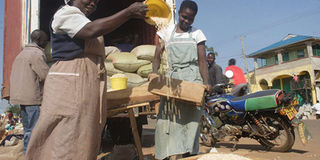To attain the food security dream, everyone must do their part diligently

Traders sift their maize ready for sale in a marketplace. For the country to attain the food security dream, everyone must do their part diligently. FILE PHOTO | NMG
What you need to know:
- Narok is mainly a livestock and large-scale wheat production region, although unknown to many, farmers have embraced other crops in a big way, taking up technology as well as new farming methods.
- Farmers want to know what activities to undertake, how best to do them, the expected risks and how to manage the possible problems with minimum effect on productivity.
- During the farm clinic, one of the things that came out which farmers are struggling with are low breeds that are not only susceptible to diseases but also remain uncompetitive in the markets.
- Agriculture remains a devolved function, therefore, county governments should now more than ever partner to ensure year round, supply and access to these produce creates a winning formula for both farmers and buyers.
Last week, the Seeds of Gold farm clinic caravan landed in Narok with the message that food security is a shared future, which all of us must take part in.
We at Elgon Kenya, having criss-crossed the country since the clinics were established, were not surprised by both the turnout and the numerous questions farmers asked.
Narok is mainly a livestock and large-scale wheat production region, although unknown to many, farmers have embraced other crops in a big way, taking up technology as well as new farming methods.
The end result of these efforts is diversification in production, new incomes, lifestyle changes — for the better — as well as focus on Narok as a source of important produce such as potatoes, tomatoes and onions.
Therefore, Narok is key to the country’s food security as it produces produce used every day on our tables — wheat, meat, onions, potatoes and many more.
One of the cross-cutting challenges picked at the farm clinics all over the country is the paucity of information.
Farmers want to know what activities to undertake, how best to do them, the expected risks and how to manage the possible problems with minimum effect on productivity.
Farmers attending the Narok clinic were eager to share the livestock production challenges they contend with. The sub sector contributes up to 12 per cent of the country’s gross domestic product, while providing employment and income to 50 per cent of those working in the agriculture sector.
During the farm clinic, one of the things that came out which farmers are struggling with are low breeds that are not only susceptible to diseases but also remain uncompetitive in the markets.
DEVOLVED FUNCTION
Cross-breeding to produce superior and hardy breeds that can easily adapt to the tough arid conditions hasn’t picked up as it should.
Farmers now understand that wealth isn’t necessarily about the numbers but the quality of what they have and have been looking at improving herds.
With climate change taking a toll on farms and livestock, farmers are grappling with dwindling pasture and barren land as rains increasingly become rare.
Add this to the growing list of emerging crop threats, including the fall armyworm, tuta absoluta and false codling moth.
And when the harvests are bumper, farmers, as the Narok ones explained, are forced to sell their produce for a song as market glut interferes with prices.
Yet within a few months, biting shortage sends the prices to the ceiling, a cyclic occurrence that no one seems to address.
Agriculture remains a devolved function, therefore, county governments should now more than ever partner to ensure year round, supply and access to these produce creates a winning formula for both farmers and buyers.
Designated storage facilities for starters would come in handy in ensuring that farmers are able to keep the surplus for a later date, which would also be helpful in regulating market prices.
Again, inter-county partnerships would ensure that counties that produce more at any one season are able to trade with their neighbours who have shortages, therefore, balancing availability throughout the year.
Maina is a communications and public relations manager ([email protected])





